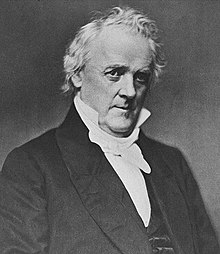

President of the United States
April 23, 1791 Cove Gap, Pennsylvania, U.S.
June 1, 1868(1868-06-01) (77) Lancaster, Pennsylvania, U.S.
March 4, 1857 – March 4, 1861
15th president of the United States (1857–61) This article is about the 15th president of the United States. For other people with the same name, see James Buchanan (disambiguation). James BuchananPhotograph by Mathew Brady, 1850–186815th President of the United StatesIn office March 4, 1857 – March 4, 1861Vice President John C. BreckinridgePreceded by Franklin PierceSucceeded by Abraham Lincoln20th United States Minister to the United KingdomIn office August 23, 1853 – March 15, 1856PresidentFranklin PiercePreceded by Joseph Reed IngersollSucceeded by George M. Dallas17th United States Secretary of StateIn office March 10, 1845 – March 7, 1849President James K. Polk Zachary Taylor Preceded by John C. CalhounSucceeded by John M. ClaytonUnited States Senator from PennsylvaniaIn office December 6, 1834 – March 5, 1845Preceded by William WilkinsSucceeded by Simon Cameron5th United States Minister to RussiaIn office June 11, 1832 – August 5, 1833PresidentAndrew JacksonPreceded by John RandolphSucceeded by William WilkinsChairman of the House Judiciary CommitteeIn office March 5, 1829 – March 3, 1831Preceded by Philip P. BarbourSucceeded by Warren R. DavisMember of the U.S. House of Representatives from PennsylvaniaIn office March 4, 1821 – March 3, 1831Preceded by Jacob Hibshman (3rd district) James S. Mitchell (4th district) Succeeded by Daniel H. Miller (3rd district) William Hiester (4th district) Constituency3rd district (1821–1823) 4th district (1823–1831)Member of the Pennsylvania House of Representatives from Lancaster CountyIn office 1814–1816Preceded by Emanuel Reigart, Joel Lightner, Jacob Grosh, John Graff, Henry Hambright, Robert MaxwellSucceeded by Joel Lightner, Hugh Martin, John Forrey, Henry Hambright, Jasper Slaymaker, Jacob Grosh Personal detailsBorn(1791-04-23 ) April 23, 1791 Cove Gap, Pennsylvania, U.S.DiedJune 1, 1868(1868-06-01) (aged 77) Lancaster, Pennsylvania, U.S.Resting placeWoodward Hill CemeteryPolitical party Federalist (1814–1824) Democratic-Republican (1824–1828) Democratic (1828–1868) RelationsHarriet Lane (niece)EducationDickinson College (BA)OccupationPoliticianlawyerSignatureMilitary serviceAllegianceUnited StatesBranch/servicePennsylvania MilitiaYears of service1814RankPrivateUnitHenry Shippen's Company, 1st Brigade, 4th DivisionBattles/wars War of 1812 Defense of Baltimore James Buchanan Jr. (/b ʌ ˈ k æ n ən / buh-CAN -nən; April 23, 1791 – June 1, 1868) was an American lawyer and politician who served as the 15th president of the United States from 1857 to 1861. He previously served as secretary of state from 1845 to 1849 and represented Pennsylvania in both houses of the U.S. Congress. He was a states' rights advocate, and minimized the role of the federal government in the nation's final years of slavery. Buchanan was a prominent lawyer in Pennsylvania and won his first election to the state's House of Representatives as a Federalist. He was elected to the U.S. House of Representatives in 1820 and retained that post for 11 years, aligning with Andrew Jackson's Democratic Party. Buchanan served as Jackson's minister to Russia (1832). He won election in 1834 as a U.S. senator from Pennsylvania and also held that position for 11 years. Buchanan was appointed to serve as President James K. Polk's secretary of state in 1845, and eight years later was named as President Franklin Pierce's minister to the United Kingdom. In 1846, Buchanan was elected as a member to the American Philosophical Society. Beginning in 1844, Buchanan became a regular contender for the Democratic party's presidential nomination. He was finally nominated in 1856, defeating incumbent Franklin Pierce and Senator Stephen A. Douglas at the Democratic National Convention; he benefited from the fact that he had been out of the country (as ambassador in London) and thus had not been involved in slavery issues. Buchanan and running mate John C. Breckinridge of Kentucky carried every slave state except Maryland, defeating anti-slavery Republican John C. Frémont and Know-Nothing former president Millard Fillmore to win the 1856 presidential election. As President, Buchanan intervened in the Supreme Court to gather majority support of the pro-slavery and anti-black decision in the Dred Scott case. He did what Southern leaders wanted in attempting to engineer Kansas coming into the Union as a slave state under the Lecompton Constitution. He thereby angered not only the Republicans but also many Northern Democrats. Buchanan honored his pledge to serve only one term, and supported Breckinridge's unsuccessful candidacy in the 1860 presidential election. He failed to reconcile the fractured Democratic party due to a simmering grudge against Stephen Douglas, leading to a four-way electoral split and the election of Republican and former Congressman Abraham Lincoln. Just weeks after Lincoln was elected as Buchanan's successor, Southern states began seceding from the Union, precipitating the American Civil War. Buchanan's bumbling leadership during his lame duck period was widely criticized. He simultaneously angered the North by not stopping secession, and the South by not acceding to their secession. He supported the ill-fated Corwin Amendment in an attempt to reconcile the country, but it was too little too late. He made an unsuccessful attempt to reinforce the defenders of Fort Sumter, but otherwise refrained from taking any action to prepare the military. His failure to forestall the Civil War has been described alternatively as incompetent inaction, or passive acceptance of the South. Many contemporaries blamed him for the war, and he was much reviled after his presidency. He spent his last years defending his reputation. In his personal life, Buchanan never married and as of 2021, he is the only U.S. president to remain a lifelong bachelor. Biographers have variously suggested that he was celibate, homosexual, or asexual. Buchanan died of respiratory failure in 1868, and was buried in Lancaster, Pennsylvania, where he had lived for nearly 60 years. Modern historians and critics condemn him for not addressing the issue of slavery or forestalling the secession of the Southern states over it. Historians and scholars consistently rank Buchanan as one of the country's worst presidents.

We use cookies
We use cookies and other tracking technologies to improve your browsing experience on our website, to show you personalized content and targeted ads, to analyze our website traffic, and to understand where our visitors are coming from. Privacy Policy.